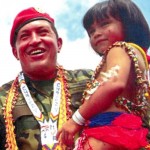
By Rick Kearns, Indian Country Today Media Network
For some indigenous people of Venezuela, President Hugo Chavez was someone they could count on and love and many indigenous Latin Americans expressed those same feelings last week.
Indigenous people in Venezuela and throughout Latin America were among the millions of people mourning the death of President Chavez of Venezuela, a man who helped change the nation’s constitution to protect indigenous rights and who returned more than 4 million acres of land to many tribes among other accomplishments.
Messages of solidarity and condolences came quickly after the news of Chavez death on Wednesday, March 5, after a two-year battle with cancer.
On that same day, the most famous indigenous leader in this hemisphere, his friend and ally, President Evo Morales of Bolivia stated, “It hurts us. We are devastated.”
“My brother in solidarity,” Morales continued in a government press release, “a revolutionary Latin American compatriot who fought for his country, for the big country of Simon Bolivar, a comrade who gave his life for the liberation of the Venezuelan people, of the people of Latin America.”
Indigenous leaders from other countries such as Ecuador and Brazil sent condolences through traditional and social media.
“I feel enormous sadness,” stated Humberto Cholango, President of the Confederation of Indigenous Nationalities of Ecuador (CONAIE in Spanish), the largest indigenous coalition in that country.
“He will live on as an example of the struggle against imperialism,” Cholango added.
Another indigenous Ecuadorean leader, Delia Caguana, President of the Indigenous Movement of Chimborazo, issued a strongly worded press release through Facebook.
“Our deepest feeling of solidarity for his family and the Venezuelan people,” Caguana stated, “for the loss of a valiant leader such as the Comandante Hugo Chavez Frias…his vocation to seek a change for the most vulnerable people of his beloved country, his clear and firm ideas of revolution deeply touched the hearts of Venezuelans, Latin Americans and even the whole world for his confrontations with and questioning of the groups in power that sought their own profits with no concern for the destruction of Pachamama (Mother Earth).”
Marcos Terena, an internationally known indigenous activist from Brazil also posted on Facebook that, “From our hearts, respect and solidarity to the people of Venezuela and the Indigenous Peoples on the death of Chavez.”
While these messages of solidarity and condolence came from various Indigenous Peoples, there were also articles and essays published by indigenous Venezuelans, also through traditional and social media.
Jayariyú Farías Montiel, editor of the award winning indigenous newspaper Wayuunaiki, published a column entitled The Indigenous People Weep for Chavez on Thursday, March 6th, recounting the history of Chavez advocacy for indigenous people starting in 1998.
“During the presidential campaign of 1998, diverse indigenous leaders exposed the situation to him, of the exclusion of the Indigenous Peoples from power, he was very moved by this,” Montiel wrote, “and he was clear in his ideals for justice and promised to change that reality.”
Montiel noted that upon reaching the presidency in 1999, Chavez named an indigenous woman, Atala Uriana, as his Minister of the Environment, “…putting her into his cabinet leaving the entire continent perplexed by this.”
His first act as president was one of inclusion, she continued, but his second act would leave a strong imprint on the country: the creation of a constituent assembly that would go on to create a new Constitution. It was in this new document that indigenous rights were protected. Article 119 of the new constitution for instance, recognizes the social, political, and economic organization of indigenous communities, as well as their cultures, languages, rights, and lands. Specifically, land rights were defined as collective, inalienable, and non-transferable.
Montiel also pointed out that “The political participation was solidified in an immediate way following the new Constitutional precepts and three indigenous representatives…initiated, along with the president a legislative path that opened the way for other laws.”
The new laws also allowed for the granting of land titles, over 12 years, of 4,472,589 acres of land to indigenous communities throughout Venezuela.
But for Kenami Padron, a Jivi member of the National Assembly, Chavez accomplishments had an emotional impact. On Facebook, Padron published a photo of her then 5-year-old cousin being held by Chavez who was wearing indigenous necklaces and smiling (at an event in the Amazonian town of Alto Orinoco in 2003).
When asked for permission to use the photo, Padron said, “yes, but I hope it will be used in a way that shows the work of love that Chavez did for the indigenous people. We will never forget the loyalty of the comandante of the Indigenous Peoples, Father of the country.”
Read more at http://indiancountrytodaymedianetwork.com/2013/03/12/indigenous-latin-americans-mourn-death-hugo-chavez-148122
